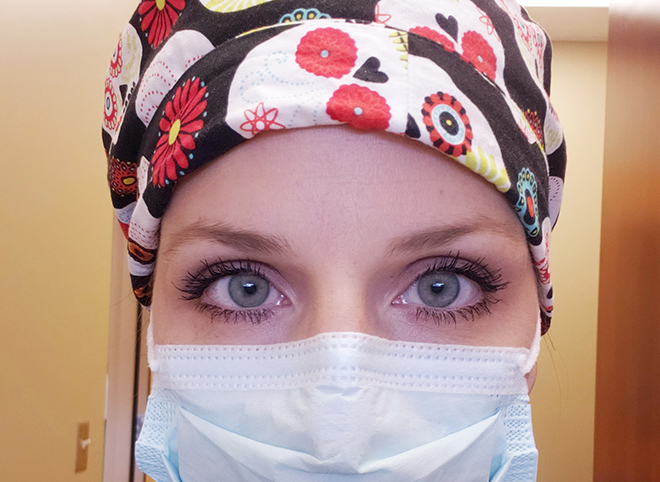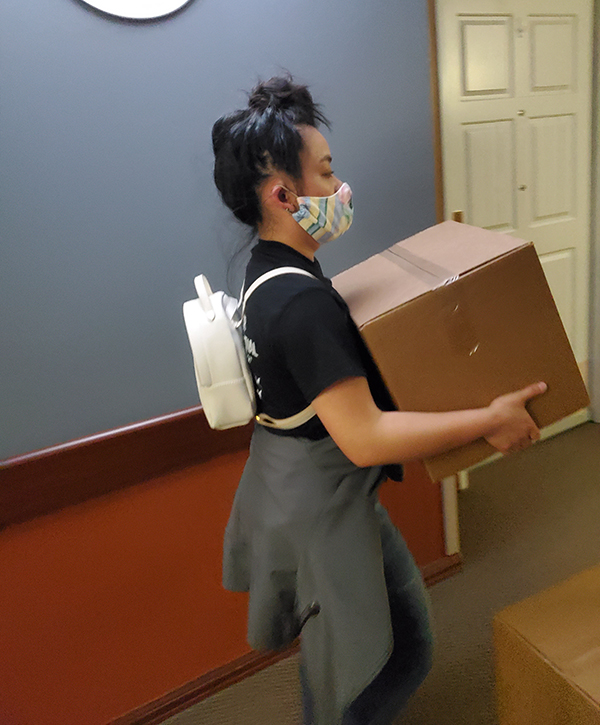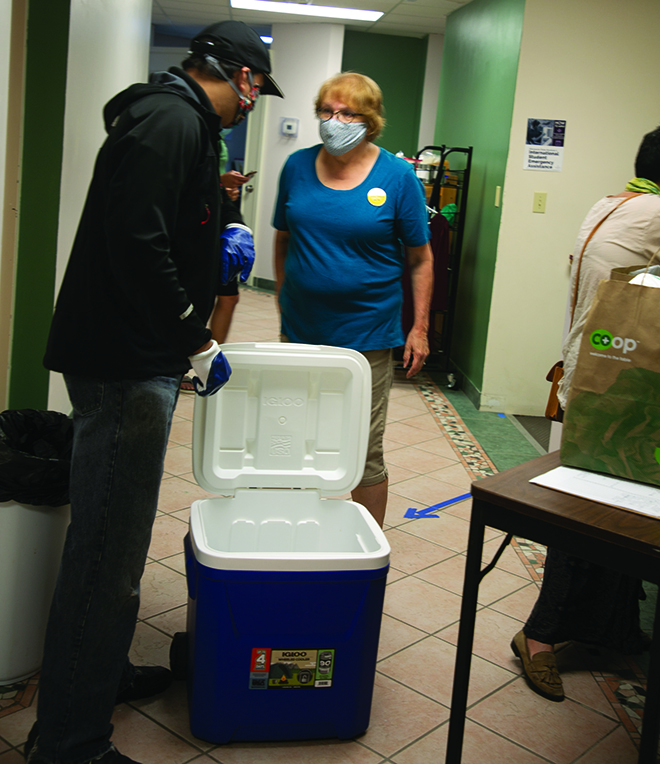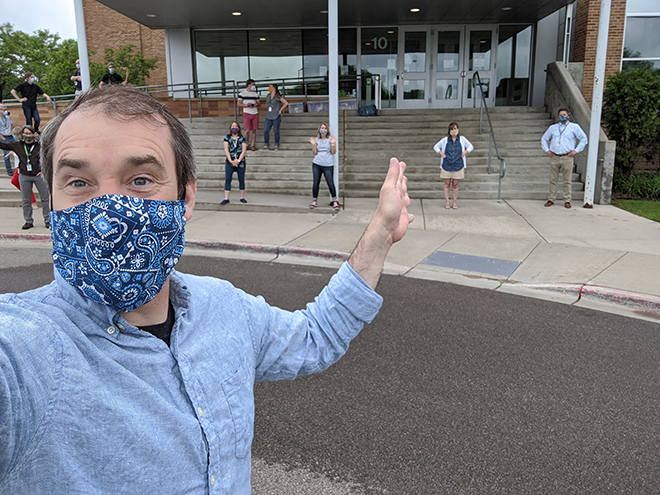From working on the front lines in hospitals and clinics to figuring out ways to keep children fed without school lunches, University alumni are finding creative, resourceful and compassionate ways to care for their communities.
From the beginning, healthcare workers have faced much of the danger and uncertainty of the COVID-19 situation. As they’ve tried to protect patients from a virus still not fully understood, they’ve pulled exhausting shifts and risked contamination on a daily basis.
University student Cy Schweiss is a registered nurse at a rural hospital in Minnesota. Schweiss, who is currently working toward her Doctor of Nursing Practice, has had to find new ways to protect patients while giving their families the best access for visits that quarantine can allow.
Schweiss shared the story of one elderly patient who had been in multiple hospitals and was finally returning to his home hospital. Because of quarantine, he had not been able to see or touch most of his family for several months. When he returned home, his family wanted to visit, but they could only look at him through his window—10 feet above the ground. So, Schweiss got creative.
“I moved every piece of furniture in the room, moved his bed as close to the window as possible and raised his bed up as high it would go,” she said. “He could see his family and talk to them through the window. It was the biggest smile I had ever seen on that man’s face.”

Schweiss credits the University nursing program for her holistic perspective on nursing, saying that it teaches students to consider not only patients but also their families.
“It was really helpful to learn how important the family is,” Schweiss said. “You really don’t understand [at first] the impact it makes on patients and their healing process. Nurses have to think critically, but we also have to be creative to make sure that we’re providing families and patients as much together time as possible.”
According to Sandra Eggenberger, director of the Glen Taylor Nursing Institute for Family and Society., the program’s emphasis on family nursing is fundamentally important—especially now in a time where so many people are affected by a health crisis.
“Our whole view of nursing practice and healthcare is that for us to improve health outcomes, we need to have a focus on the individual, the family and the society,” she said. “[Students] recognize that idea of what happens with the family and what happens to the family in the community all has to do with our health outcomes.”
Eggenberger has been contacted by several students who graduated from the University’s nursing program and are now working in their chosen field, and she said they’ve shared stories of how they’re putting what they learned in the classroom to work while treating COVID-19.
“I can just hear it in the students’ voices, what kinds of challenges they’re facing—the threats, the anxieties, the stresses, the fears—but they’re also showing us their strength,” she said.
“They feel very confident that in spite of all that’s going in our world, they’re prepared. I’m very proud of their resiliency in the face of all this challenge.”
On-the-job leadership
Dietitians and nutritionists play a critical role in the fight against the coronavirus, according to Dr. Joyce Bond, acting dietetics program director at the University. Examples include calculating the necessary nutrients for a patient who’s on a ventilator, along with helping patients who are recovering from COVID-19 and dealing with ongoing symptoms such as lack of their sense of taste. Dietitians also worked with schools to help students receive nutritious lunches, even when schools were closed, and have continued to educate their communities about how best take care of themselves and their families in these difficult times.
Mavericks coming out of the University’s dietetics program have been involved in all of these areas during internships that spread across the country. For the past two years, the program has had 100 percent placement for internships, which are necessary for students to eventually become accredited as registered dietitians. Mavericks who graduated in May 2020 have found internships at universities, hospitals, clinics, food service companies and other real-world locations.
As for why the Dietetics Program has had such success for the past several years—including a more-than-90-percent pass rate for the registered dietitian exam—Bond said it’s be- cause the program is able to offer one-on-one education for students that’s family-focused and holistic in its scope.
“We’re really able to get to know our students really well and work with them from the very beginning,” Bond said. “We spend a lot of time advising students that it’s not only grades that are important in being a good dietitian; it’s also about getting experience in leadership and in the community. We focus on the family, [which] gives our students a perspective that nobody exists in a vacuum. I think our students get a really good sense of how that affects people’s behavior when it comes to food and eating and food preparation.”
Like dietitians, community health specialists also play a vital role during these times, both in educating how to stay healthy and helping people recovering from COVID-19. Pa Houa “PH” Moua graduated from the University with a degree in community health education in 2017 and now works as a community health specialist in Olmstead County Public Health Services in Minnesota.
While Moua’s job usually focuses on tobacco prevention and worksite wellness, everything changed when the pandemic swept through the country. She was activated as an essential worker in March, and she has done everything from educating community partners about the basics of the virus to answering phone calls from concerned residents. Now, Moua is the coordinator for the county’s medical reserve corps, which is helping at Olmstead County’s only testing site. While she mostly works from home, Moua also works at the testing site once a week, clad in full personal protective gear as she greets arrivals and helps them understand the process.

“It’s been a crazy ride,” she said. “You know that you’re doing it for the greater good and the whole [health] of the public. That’s what really drives me—when I think about the bigger picture. However small I’m helping, I’m helping a little bit. I take comfort in that.”
Creative solutions
Many other University grads have found unique ways to help based on their abilities and resources. One pair of 2018 graduates, Bella Lam and Myles Olson, are working together to fill a critical need through their business, Coconut Whisk. The St. Paul-based company, which won the Agriculture and Food/Beverage category in the 2018 Big Ideas Challenge hosted by the College of Business, makes and distributes healthy vegan baking mixes.
When Lam, who graduated with a degree in public health education, heard that schools were closing because of COVID-19, she realized the struggle that some families would face when they lost free school lunches. To help combat this, Coconut Whisk has donated boxes of its mixes to more than 60 families and also made donations to Food for Life Global, a nonprofit vegan relief organization.
“I feel like during times of crisis, you can either just stay stuck and feel helpless, or you can find a way to contribute and help your community however you can,” Lam said.

Another Maverick business working for good is Infuzn, which is based in Pine Island and makes, delivers and distributes Indian-inspired dishes and products for home and com mercial use. Started by University faculty member Chandrasekhar Valluri and his two partners, Ananth Kollengode and Sudharsan Iyengar, the company committed to donating 1,000 pounds of food to area communities. By mid-July the effort had delivered more than 795 pounds of cooked meals so far, sending the food to organizations and front-line workers in the Pine Island area. In addition, Infuzn sent meals to the Campus Cupboard, which has been particularly critical in meeting the needs of international students in Mankato.
“As a community member of the University, when you see or hear of situations where people are in need and you have some capacity to be of assistance, it goes without saying,” Valluri said.

Sean Beaverson, who earned his Specialist Degree in Educational Leadership from the University this May, doesn’t have a company that he can use to raise funds or supplies, but he’s still working hard to help his community—through education. During spring semester, Beaverson was working in Edina Public Schools when the district needed to completely overhaul its curriculum to online courses. His team came up with a contingency plan, was in charge of helping teachers transition to distance learning and worked with the Minnesota Department of Education to gather educators for online training sessions.
Like Schweiss, Moua, Lam and Valluri, Beaverson continues to adapt and find creative solutions during an ever-changing situation with no clear ending. While COVID-19 will have lasting impact even after the pandemic ends, these Mavericks and countless others are committed to helping their communities thrive—and even come out stronger in the end.
“We want to take all we’ve learned,” Beaverson said, “and reap the benefits going forward.”
Speak Your Mind